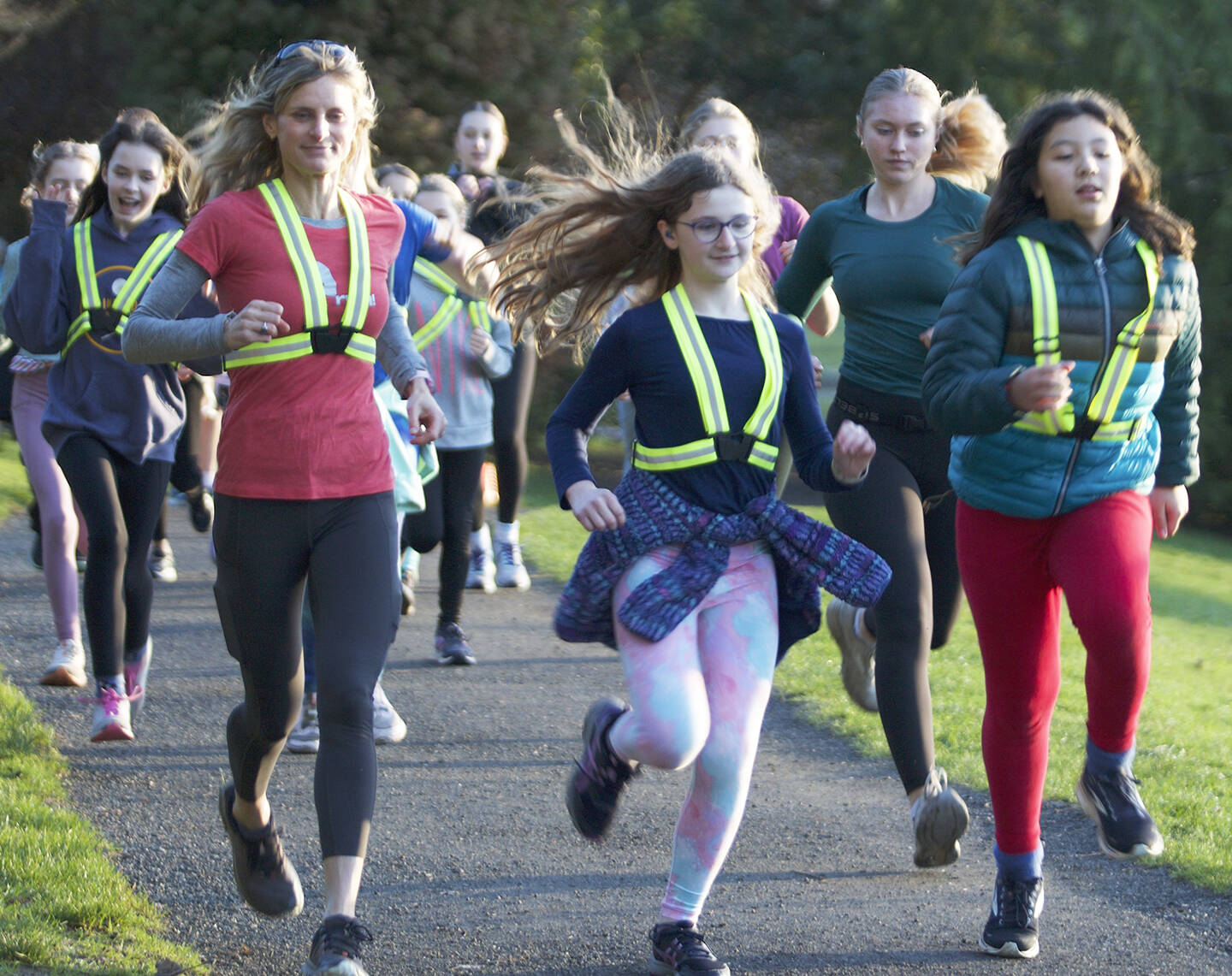Are you faster than a fifth-grader? On Bainbridge Island, that’s a serious question.
Go Run Bainbridge is an all-girls nonprofit running club that introduces fourth- through sixth-graders from Kitsap County to cross-country running. The team meets twice a week after school for training, rain or shine, which involves warm-ups, relay and running games, but also covers nutrition and self-care. They train for six weeks, but the skills they learn go way past the finish line, said co-director Ann Browning, a local running advocate.
“[The girls] realize these challenges, and know they can do really hard stuff,” Browning said. “They just get out there and do it. It opens them up to athleticism and being outside.”
The club was founded in 2006 by three women: Anne Howard, Heidi Washenberger and Kay Jensen. The three knew that active lifestyles are a big part of BI culture, but too often, pre-teen girls were deterred from sports because of social pressure or insecurity spurred by puberty. Howard, Washenberger and Jensen wanted to create a way for young girls to reconnect with their bodies and find joy and freedom in exercise — and Go Run Bainbridge was born.
“There’s quite an age range there, and when they all get together, it’s really neat to see how they work with each other,” Browning said. She said the fourth-graders tend to be rambunctious, but their sixth-grade counterparts are more mature, and can help lead their teammates. “It’s fun to see them be proud of themselves.”
Today, Browning is head coach and co-director of the nonprofit, along with Bainbridge High School cross-country coach Dana Amore. On the field, Go Run leadership is supported by several assistant coaches, including Howard and four to six high school-age mentors — many of whom are former members of Go Run. While Browning and Amore are not Go Run alumnae themselves, their daughters are. Both coaches were drawn to the club’s message that “every girl is an athlete” and that confidence is king- er, queen.
Results like these, not race times, are part of the appeal. Before running a practice 5k on Feb. 1, the group of 30 or so girls was laughing and goofing around together. Many were climbing trees, telling jokes, singing songs and excitedly warming up, corraled by Browning, Howard and a few other parents. It was a bright afternoon, but their parents said, the young athletes don’t stop for much.
“We go out in all the weather, whether it’s raining, a little bit snowy, cold or wet, and the kids do it — and they really don’t complain,” Browning said. “They’re really brave, and at the end of practice, they’re high fiving each other and bubbly and full of energy.”
The program has fostered about 1,000 young athletes and over 200 mentors since its inception in 2006. There are two six-week sessions, winter and spring, and both cost $205-$225. The funds go toward race registrations, t-shirts, safety gear, snacks and scholarships — usually one full-ride is offered per session.
Lots of the kids go on to join cross country teams at their middle and high schools, and some join other sports or dance. A few forgo team sports, but the health habits stick with them, which has lifelong impacts, Browning said. Besides, the point of getting girls running isn’t just to prepare them for a cross-country career. It’s also about learning confidence — and the teen mentors are a key part of that.
This year’s Go Run teen mentors—Lili Pohl, Sian Willey, Devon Biddle, Kate Hansen and Uma Pal—are all athletes and students themselves, but they make time to attend practice and motivate the kids. They all can attest firsthand to the importance of running and team sports for girls.
For one, as a flexible form of exercise, running is a great introduction to other sports, Willey and Pal pointed out. Plus, because track meets do not have to be directly competitive, girls can forge strong bonds with their teammates, Hansen and Biddle added.
The most satisfying aspect by far, Pohl and Browning agreed, is the growth girls exhibit over the session. “I love seeing girls struggling at the beginning, and then progressing over the season. They usually don’t even see it until they cross the finish line and hear that they beat their time,” Pohl said. “It motivates them to come back.”


